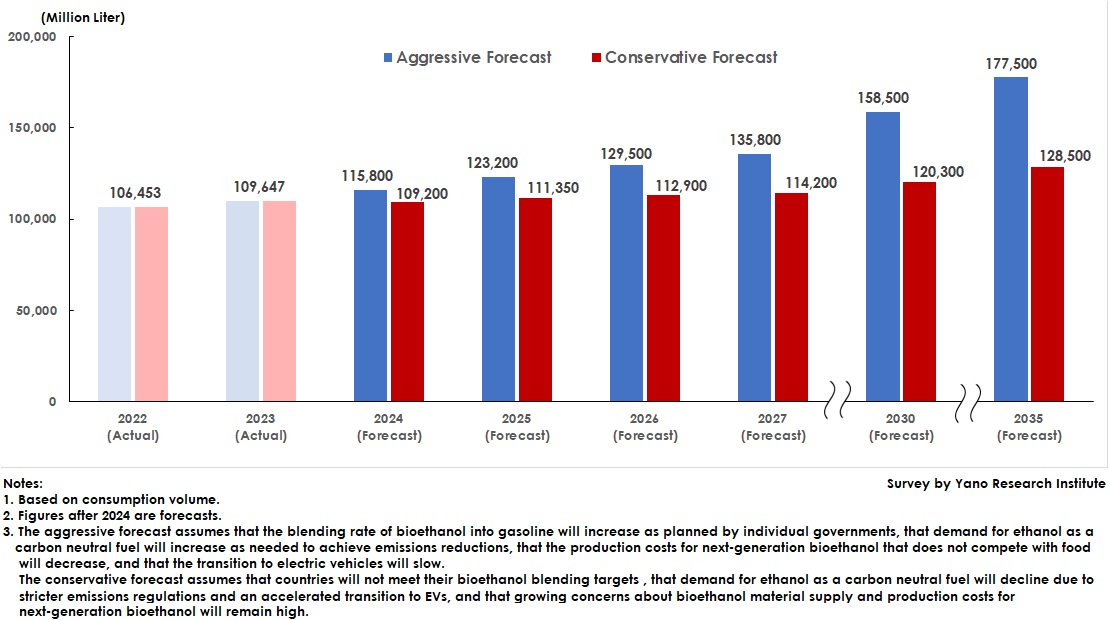No.3716
Global Market for Carbon Neutral Automotive Fuels: Key Research Findings 2024
Global Consumption of Automotive Bioethanol to be 177.5 Billion Liters in 2035
Yano Research Institute (the President, Takashi Mizukoshi) has surveyed the global automotive industry that is to be affected by decarbonization and has found out the overview of global automotive carbon neutral fuels market, trends by category, trends of market players, and future outlook. In here releases the forecasts of global automotive bioethanol consumption and average blending rate through 2035.

Market Overview
Today, the world faces the challenge of “more energy, less emissions,” which requires decarbonization through emission reduction efforts, while at the same time facing an ever-increasing demand for energy due to populational and economic growth in emerging countries.
In conjunction with the development of the energy security issue triggered by the Russian invasion of Ukraine, the importance of carbon-neutral fuels, represented by biofuels and synthetic fuels, has increased in recent years.
Emerging economies such as Brazil, India, and Indonesia are promoting biofuels in particular as part of national policy and as a solution to several challenges at once, such as promoting of agriculture, responding to rapidly growing fuel demand, improving trade balances, and decarbonization. In Europe and the United States, in addition to expanding the penetration of next-generation biofuels with high emission reduction efficiencies, demonstration projects for synthetic fuels and green hydrogen have been launched and pilot production is underway.
As the BEV transition slows, automakers (OEMs) have shifted from “zero tailpipe emissions” to a more realistic goal of well-to-wheel based decarbonization. They are targeting Scope3 emissions reductions through engine development that emphasizes adaptation with carbon-neutral fuels or being combined with electric powertrains.
Noteworthy Topics
Global Bioethanol Market Trends
In 2023, global automotive bioethanol consumption in volume was 109,647 million liters, with the average blending rate of bioethanol to gasoline 7.1%.
In the United States, a volume consumer, E10 is the mainstream with an average blending rate of 10.0%. In California, a stricter Low Carbon Fuel Standard (LCFS) has led to three times the consumption of E85 (gasoline blended with 85% ethanol) than in 2019, with higher emission reduction efficiency.
In India, abundant sugarcane production and strong policy support have led to three times the consumption of bioethanol than in 2019, with the average blending rates exceeding 10%. Growing demand for bioethanol and extreme weather conditions have tightened sugarcane supplies, benefiting Brazil.
Brazil has offset the reduction in sugarcane ethanol production with corn ethanol production. The average blending rate in the country has been maintained at 45.9%.
Future Outlook
As carbon neutral fuels are increasingly adopted in the automotive sector, we have forecast global automotive bioethanol consumption through 2035 and the average blending rate of bioethanol into gasoline based on two assumptions, an aggressive assumption and a conservative assumption.
The aggressive forecast assumes that the blending rate of bioethanol into gasoline will increase as planned by individual governments, that demand for ethanol as a carbon neutral fuel will increase as needed to achieve emissions reductions, that the production costs for next-generation bioethanol that does not compete with food will decrease, and that the transition to electric vehicles will slow. On the other hand, the conservative forecast assumes that countries will not meet their bioethanol blending targets, that demand for ethanol as a carbon neutral fuel will decline due to stricter emissions regulations and an accelerated transition to EVs, and that growing concerns about bioethanol material supply and production costs for next-generation bioethanol will remain high.
India is targeting E20 nationwide by April 2025, while Brazil is considering mandating E30 by 2030. Europe and the United States are looking to expand the penetration of next-generation ethanol. According to the aggressive forecast, global ethanol consumption is expected to reach 158.5 billion liters in 2030 with an average blend rate of 9.5%, which is projected to increase to 177.5 billion liters in 2035, up 61.9% from 2023, with an average blend rate of 10.5%.
In the conservative forecast, global ethanol consumption is expected to reach 120.3 billion liters with an average blend rate of 7.2% in 2030, which is projected to increase to 128.5 billion liters in 2035, up 17.2% from 2023, with an average blend rate of 7.6%.
Research Outline
2.Research Object: Automakers, fuel companies, etc.
3.Research Methogology: Face-to-face interviews (including online) by expert researchers, survey via phone, and literature research
Bioethanol Consumption Forecast
This research has surveyed the trends in the automotive industry (automakers and automotive part suppliers) and energy companies as they transition to decarbonization.
While the shift to battery electric vehicles (BEVs) is slowing, synthetic fuels appear promising in the long-term perspective among carbon neutral fuels that are anticipated as another decarbonization method, but biofuels are the realistic choice in the short-term vision. This research has focused on bioethanol, biodiesel, biogas, and hydrogen used as automotive fuels.
Bioethanol consumption in this study represents bioethanol consumed as an automotive fuel. The average blending ratio was calculated using the gasoline consumption of vehicles containing bioethanol as the denominator and the bioethanol consumption among them as the numerator.
Reference:
Decarbonization Changes Global Automotive Industry: Key Research Findings 2024 (released on 19 December 2024)
https://www.yanoresearch.com/en/press-release/show/press_id/3675
<Products and Services in the Market>
Automotive carbon neutral fuels (bioethanol, biodiesel, biogas, and hydrogen), flexible-fuel vehicles (FFVs)
Published Report
Contact Us
The copyright and all other rights pertaining to this report belong to Yano Research Institute.
Please contact our PR team when quoting the report contents for the purpose other than media coverage.
Depending on the purpose of using our report, we may ask you to present your sentences for confirmation beforehand.